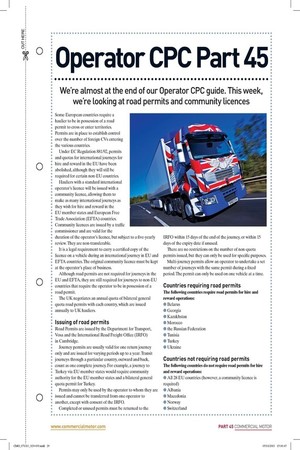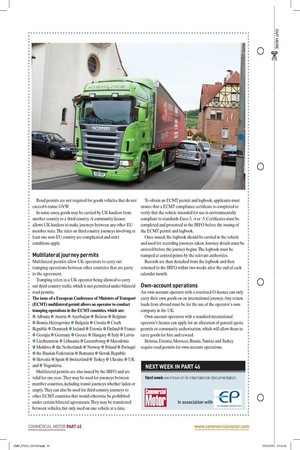Operator CPC Part 45
Page 22

Page 23

If you've noticed an error in this article please click here to report it so we can fix it.
Were almost at the end of our Operator CPC guide. This week, were looking at road permits and community licences
Some European countries require a haulier to be in possession of a road permit to cross or enter territories. Permits are in place to establish control over the number of foreign CVs entering the various countries.
Under EC Regulation 881/92, permits and quotas for international journeys for hire and reward in the EU have been abolished, although they will still be required for certain non-EU countries. Hauliers with a standard international operator's licence will be issued with a community licence, allowing them to make as many international journeys as they wish for hire and reward in the EU member states and European Free Trade Association (EFTA) countries. Community licences are issued by a traffic commissioner and are valid for the
duration of the operator's licence, but subject to a five-yearly review. They are non-transferable.
It is a legal requirement to carry a certified copy of the licence on a vehicle during an international journey in EU and EFTA countries. The original community licence must be kept at the operator's place of business.
Although road permits are not required for journeys in the EU and EFTA, they are still required for journeys to non-EU countries that require the operator to be in possession of a road permit.
The UK negotiates an annual quota of bilateral general quota road permits with each country, which are issued annually to UK hauliers. Issuing of road permits
Road Permits are issued by the Department for Transport, Vosa and the International Road Freight Office (IRFO) in Cambridge.
Journey permits are usually valid for one return journey only and are issued for varying periods up to a year. Transit journeys through a particular country, outward and back, count as one complete journey. For example, a journey to Turkey via EU member states would require community authority for the EU member states and a bilateral general quota permit for Turkey.
Permits may only be used by the operator to whom they are issued and cannot be transferred from one operator to another, except with consent of the IRFO. Completed or unused permits must be returned to the
IRFO within 15 days of the end of the journey, or within 15 days of the expiry date if unused.
There are no restrictions on the number of non-quota permits issued, but they can only be used for specific purposes.
Multi-journey permits allow an operator to undertake a set number of journeys with the same permit during a fixed period. The permit can only be used on one vehicle at a time. Countries requiring road permits The following countries require road permits for hire and reward operations: • Betarns • Georgia • Kazakhstan • Morocco • the Russian Federation • Tunisia • Turkey • Ukraine Countries not requiring road permits The following countries do not require road permits for hire and reward operations: • All 28 EU countries (however, a community licence is required) • Albania • Macedonia • Norway • Switzerland
Road permits are not required for goods vehicles that do not exceed 6-tonne GVVV.
In some cases, goods may be carried by UK hauliers from another country to a third country. A community licence allows UK hauliers to make journeys between any other EU member state. The rules on third country journeys involving at least one non-EU country are complicated and strict conditions apply. Multilateral journey permits
Multilateral permits allow UK operators to carry out tramping operations between other countries that are party to the agreement.
Tramping refers to a UK operator being allowed to carry out third-country traffic, which is not permitted under bilateral road permits. The issue of a European Conference of Ministers of Transport (ECMT) multilateral permit allows an operator to conduct tramping operations in the ECMT countries, which are: • Albania • Austria • Azerbaijan • Belarus • Belgium • Bosnia-Herzegovina • Bulgaria • Croatia • Czech Republic • Denmark • Ireland • Estonia • Finland • France • Georgia • Germany • Greece • Hungary • Italy • Latvia • Liechtenstein • Lithuania • Luxembourg • Macedonia • Moldova • the Netherlands • Norway • Poland • Portugal • the Russian Federation • Romania • Slovak Republic
• Slovenia • Spain • Switzerland • Turkey • Ukraine • UK and • Yugoslavia.
Multilateral permits are also issued by the IRFO and are valid for one year. They may be used for journeys between member countries, including transit journeys whether laden or empty. They can also be used for third-country journeys to other ECMT countries that would otherwise be prohibited under certain bilateral agreements. They may be transferred between vehicles, but only used on one vehicle at a time.
To obtain an ECMT permit and logbook, applicants must ensure that a ECMT compliance certificate is completed to verify that the vehicle intended for use is environmentally compliant to standards Euro-3, -4 or -5. Certificates must be completed and presented to the IRFO before the issuing of the ECMT permit and logbook.
Once issued, the logbook should be carried in the vehicle and used for recording journeys taken. Journey details must be entered before the journey begins The logbook must be stamped at control points by the relevant authorities.
Records are then detached from the logbook and then returned to the IRFO within two weeks after the end of each calendar month. Own-account operations
An own-account operator with a restricted 0-licence can only carry their own goods on an international journey. Any return loads from abroad must be for the use of the operator's own company in the UK.
Own-account operators with a standard international operator's licence can apply for an allocation of general quota permits or community authorisation, which will allow them to carry goods for hire and reward.
Belarus, Estonia, Morocco, Russia, Tunisia and Turkey require road permits for own-account operations.








































